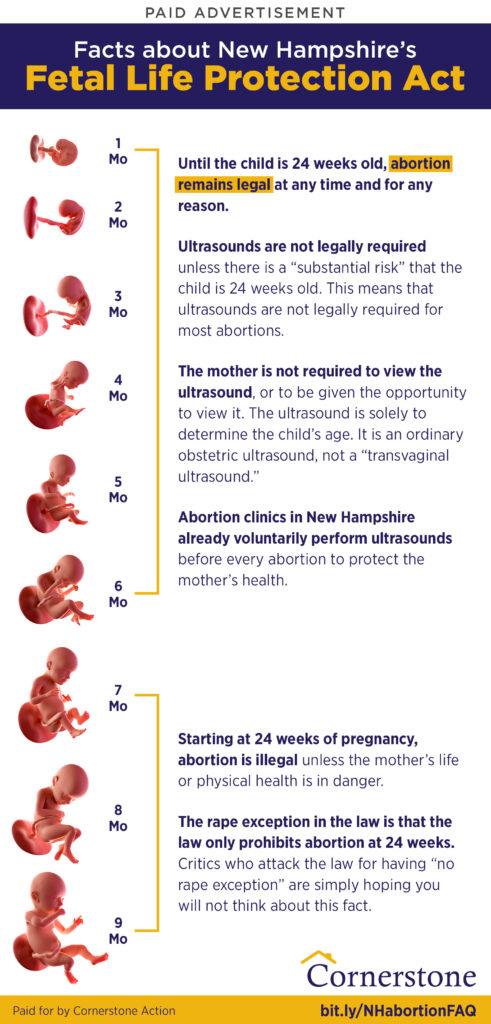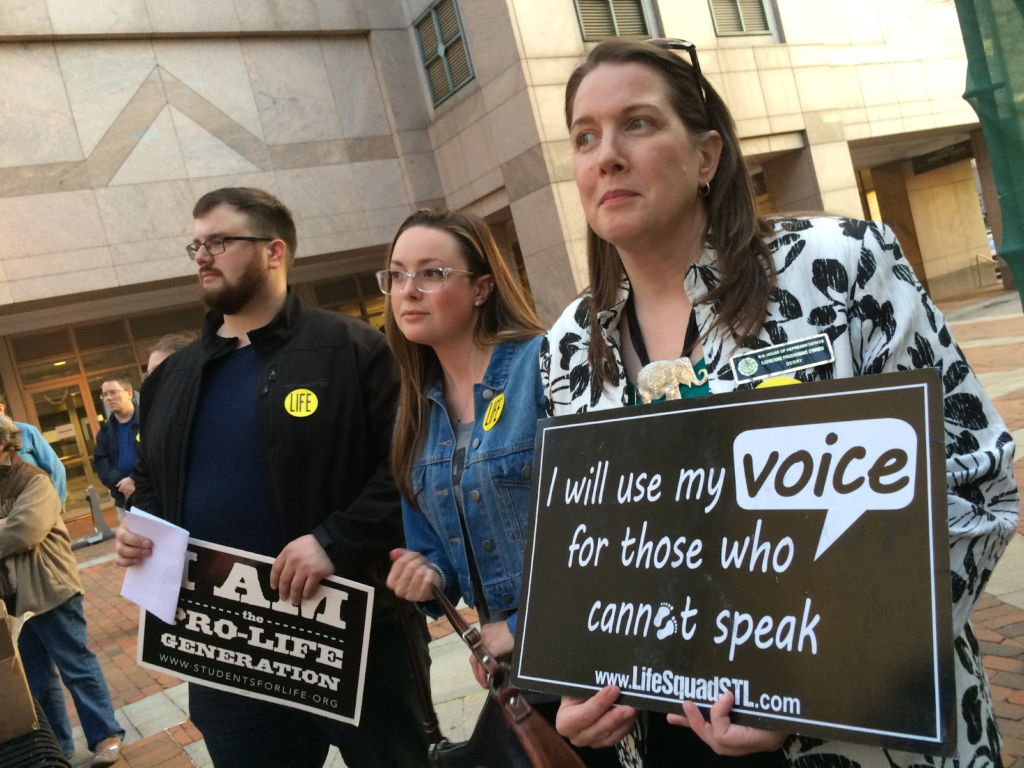On June 24, 2021, New Hampshire lawmakers passed the state budget, HB 2. Sections 37-40 of the budget enact the Fetal Life Protection Act, or FLPA—New Hampshire’s first ban on late-term abortion. The FLPA has been signed into law and went into effect on January 1, 2022.
At a time when other states are legalizing abortion up to birth, the Granite State has boldly gone in the opposite direction and rejected its longstanding commitment to pro-abortion absolutism. In fact, New Hampshire is the first state in the country to go from allowing abortion up to birth to passing a late-term abortion ban.
Below are some common questions about the Fetal Life Protection Act and our responses.
Q: What does the Act do?
The Act prohibits the abortion of viable infants at or after 24 weeks of gestation—that is, six months of pregnancy—with exceptions for the mother’s life or physical health.
Under the Act, there are two scenarios where an abortion provider is guilty of a crime. First, the provider will be guilty if he performs an abortion and knows that the child is at least 24 weeks old. Secondly, the provider will be guilty of a crime if he performs an abortion and knows of a “substantial risk” that the child is at least 24 weeks old.
Outside of those two scenarios, there are no situations where an abortion provider will face penalties of any kind.
Q: Does the Act include an ultrasound requirement?
Yes. New Hampshire Public Radio has reported that performing ultrasounds before abortions is already the normal practice in New Hampshire. The Lovering Health Center in Greenland, for instance, says that ultrasounds are necessary to make sure that patients “are in a safe place to have an abortion.”
According to NHPR, New Hampshire is the 28th state in the nation to have an ultrasound requirement.
New Hampshire, however, has one of the most modest ultrasound requirements in the entire country. Under the Act, performing an abortion without an ultrasound will only be punished in one situation: where there is a “substantial risk” that the child is at least 24 weeks old. In any other circumstance, the provider can skip the ultrasound and face no penalties under the Act.
Q: Does the Act require a “transvaginal ultrasound”?
No. That claim appears to have been simply invented in bad faith.
The law says only that a “health care provider shall conduct an obstetric ultrasound examination” before performing the abortion. An “obstetric ultrasound” is simply another way of describing any ultrasound performed during pregnancy.
Q: Will the Act’s ultrasound requirement be costly?
No. As discussed above, it is only a crime to perform an abortion without an ultrasound where there is a “substantial risk” that the child is at least 24 weeks old. Early in pregnancy, abortion providers can skip the ultrasound and face no legal penalties of any kind.
Abortion advocates themselves claim that late-term abortions are rare in New Hampshire. This means that the ultrasound requirement in the Act will have a minimal impact.
Additionally, as already mentioned, performing ultrasounds before abortions is already normal practice in New Hampshire.
Q: Why does the Act require ultrasounds?
The ultrasound requirement’s sole purpose is to make a clear determination of the child’s gestational age in borderline cases. Unlike in many other states, the Act does not require that the woman view the ultrasound or be given an opportunity to view it.
The Act uses a specific gestational age to prohibit abortion: 24 weeks. That means that, if a child is somewhere around 24 weeks, we need to ensure that there is a precise determination of the child’s age.
If the ultrasound shows the child is under 24 weeks, the abortion can proceed. If the child is at or over 24 weeks, that child is protected by New Hampshire law. Making this kind of determination is necessary in order to have a clear, workable, and modest legal rule.
Q: Do other states have 24-week abortion bans?
States have a wide spectrum of laws on abortion, ranging from very restrictive to unlimited. Until very recently, banning abortion at 24 weeks was considered to be a moderate, middle-of-the-road solution.

Just a few years ago, Massachusetts, New York, and Nevada all had meaningful bans on abortion starting at 24 weeks. Over the last few years, however, pro-abortion extremists in these Democratic states have successfully removed all limitations on abortion. Today, abortion is effectively legal in all three states for any reason up to birth.
Massachusetts’ abortion ban was the last to be repealed. Until the passage of the “ROE Act” in December of 2020 Massachusetts imposed felony penalties on abortions at or after 24 weeks. The Fetal Life Protection Act has essentially taken New Hampshire back to where Massachusetts was in late 2020.
Q: Does the Act contain an exception for fetal anomalies?
Yes. This past legislative session, an amendment was passed to the Fetal Life Protection Act adding an exception for fetal anomalies incompatible with life.
Q: Does the Act contain a rape exception?
The rape exception in this bill is that it is a 24-week ban. By 24 weeks, any woman has known she is pregnant for months.
For this reason—until Massachusetts legalized abortion up to birth in December of 2020—its 24-week ban did not contain a rape exception. Nevada’s 24-week ban, which was repealed in 2019, also did not contain a rape exception.
Q: Does the ban impose felony penalties?
Yes. Both Massachusetts and Nevada had felony penalties for 24-week abortions until recently. Additionally, felony penalties are necessary to make the Act consistent with current New Hampshire law.
New Hampshire already has felony penalties in our so-called “partial-birth abortion ban.” Yet this arbitrary law only prohibits one late-term abortion procedure. A fetus can easily be aborted using other procedures at the same gestational age.
Imposing felony penalties for all abortions performed at or after 24 weeks makes New Hampshire law sensible and consistent.
Q: Does the Act punish abortion providers who are “just doing their jobs”?
No. A provider is only guilty of violating the Act if he “knows that the fetus has a gestational age of at least 24 weeks, or consciously disregards a substantial risk that the fetus has a gestational age of at least 24 weeks.”
In legal parlance, the Act punishes only knowing or “reckless” conduct. It does not punish the good faith errors of doctors or other abortion providers who are, as they say, “simply trying to do their jobs.”
Q: I tried reading the Act and it was very complicated. Why can’t it be simpler for non-lawyers to understand?
Abortion bans used to be much simpler to read. And in some states where very old abortion bans remain on the books, they still are. While New Hampshire’s ban is similar in effect to some old abortion bans, its structure is more sophisticated.
There is a good reason for this. Over the past decades, pro-abortion lawyers and judges devised constitutional arguments against almost any imaginable abortion ban. As a result, abortion law became extremely complex and precarious. Legislators needed to navigate a minefield of possible legal arguments to avoid having their bans overturned in court.
The intricate structure of the Fetal Life Protection Act was necessary to strike a finely-tuned constitutional balance: to detect and prohibit late-term abortion without placing any burden on a woman’s ability to obtain an abortion earlier in pregnancy.
Oddly, some journalists have pointed to parts of the Act that they find confusing and suggested that they could be errors. They are not. The bill has been carefully reviewed by legal scholars and litigators in New Hampshire and around the country.
Q: Is there any other reason the ban is considered “extreme”?
No. The fact is that Democratic New Hampshire legislators have overwhelmingly rejected almost every kind of late-term abortion ban you can imagine. Democrats do not oppose this ban because of the ultrasound requirement or for any other specific reason. They oppose it because it places some limitation on abortion prior to birth.
In 2018, for instance, HB 1680 sought to ban late-term abortion without imposing any criminal penalties or any ultrasound requirement. The ban also contained every kind of exception. Still, only four Democrats in the entire House voted in favor of that bill.
Thankfully, our legislators finally brought decades of ugly pro-abortion extremism to an end.
Update from October 2, 2021
As we entered the 2022 legislative session, pro-abortion extremists—including multiple Republicans—introduced bills intended to repeal the Fetal Life Protection Act or to gut the law and render it unenforceable. One of these bills, HB 622, was underhandedly created by the GOP-led House Judiciary Committee itself in an executive session.
Update from July 23, 2022
This past legislative session, pro-lifers were able to fend off a slew of attemps—brought by both Democrats and Republicans—to entirely destroy or repeal the law and allow abortion until the moment a child’s head crowns. An amendment was passed to the Fetal Life Protection Act adding an exception for fetal anomalies incompatible with life.
Contrary to false claims in the media, the ultrasound requirement remains fully in place and functionally unchanged from the original law. A minor amendment added an almost-verbatim reiteration of the ultrasound requirement’s limited scope—a limitation which was already present in the penalties section of the original law.
As always, please contact your representatives and urge them to stand firmly by the FLPA and to do everything they can to oppose repeal and gutting bills. The FLPA is New Hampshire’s only protection for children in the last months of pregnancy; if it is repealed or gutted, these children will once again be left with no legal protections.



